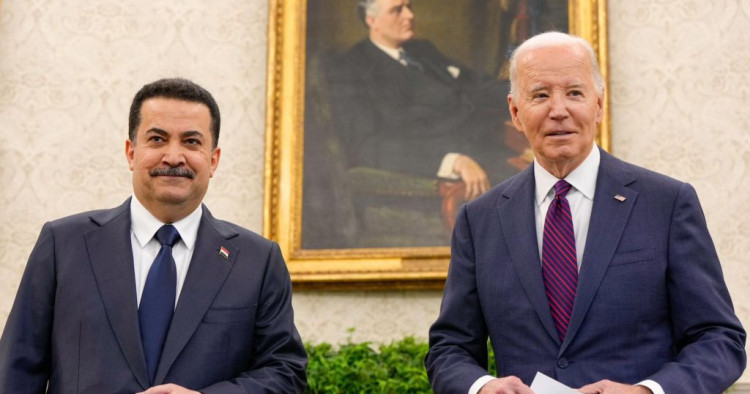Contents:
- Iranian weekend strikes threaten to derail Sudani’s Washington agenda
- What the US wants out of talks with the Iraqi prime minister
- America needs as many Middle East partners as it can get at a time of conflict and geopolitical uncertainty
- US cooperation with the Iraqi CTS is a strategic hedge against violent extremist organizations in the Middle East
- Despite growing Baghdad-Erbil tensions, Kurdish interests unlikely to be a key focus in Washington talks
- Washington wants to see progress on resuming Kurdistan oil exports, diversifying Iraq’s energy imports away from Iran
Iranian weekend strikes threaten to derail Sudani’s Washington agenda
Randa Slim
Senior Fellow and Director of Conflict Resolution and Track II Dialogues Program

-
Iraqi Prime Minister Mohammed Shia al-Sudani’s principal objective for his Washington visit was supposed to be to expand bilateral discussions beyond the military and security realms to particularly encompass issues such as education, finance, agriculture, economics, technology, and culture.
-
But Iran’s launching of hundreds of drones and missiles against Israel last weekend brought to the fore two of the most complicated issues in the US-Iraqi bilateral relationship: the status of the US military presence and Baghdad’s ability to rein in local Iran-aligned militias.
Iraqi Prime Minister Mohammed Shia al-Sudani’s long-awaited visit to Washington, DC, on April 15-19, started with a bang. Shortly prior to his arrival to the US capital, Iran and its proxies operating in Iraq, Syria, and Yemen launched a retaliatory strike targeting Israeli military facilities.
The Iraqi head of government’s principal objective for his Washington visit was supposed to be to expand bilateral discussions beyond the military and security realms to particularly encompass issues such as education, finance, agriculture, economics, technology, and culture, as indicated in the 2008 Strategic Framework Agreement between the two countries. That feat had eluded Prime Minister Sudani’s predecessors to date, as bilateral relations have remained driven by hard security issues. And the Iranian strike will now put defense and counter-terrorism matters even more front and center, especially in his meetings with US legislators and the media.
Iran’s launching of hundreds of drones and missiles against Israel last weekend brought to the fore two of the most complicated issues in the US-Iraqi bilateral relationship, which Sudani had wanted to de-emphasize during his visit. The first issue involves the US military presence in Iraq and the timeline for its withdrawal. The second concerns the Iran-aligned non-state armed groups that operate under the rubric of the “Iraqi Islamic Resistance.” Even prior to the recent Iranian attack, those two issues had major domestic implications for both the US president and the Iraqi prime minister. But Saturday’s drone and missile strike and its potential escalatory aftermath raises the stakes even higher for both leaders.
Prime Minister Sudani and some other members of the governing Coordination Framework in Baghdad do not want to see a hasty and forced withdrawal of US forces that could endanger the future of the bilateral relationship. But the fact that a US-manned Patriot air-defense system based near Erbil, Iraqi Kurdistan, was used to shoot down an Iranian ballistic missile headed toward Israel might have hastened the need for a US-Iraqi agreement on a withdrawal timetable. Iran, directly and through pro-Iran Iraqi militias, can be expected to increase its pressure on the Iraqi government to get these air-defense systems removed. And as a result, the militias might renew their targeting of US assets in Iraq and Syria.
The Coordination Framework issued a statement on April 15 expressing full support for the prime minister’s visit to Washington and endorsed his objectives to achieve progress in the bilateral relationship while noting that a sustainable relationship can be established “after the end of the international coalition’s mission, [and] the preparation for scheduling a withdrawal” of these forces. Interestingly, there was no mention of the Iranian attack on Israel; instead, the statement pointed to “an Iraqi role in stopping the aggression against Gaza and preventing the conflict from expanding in the Middle East region.” Given the circumstances, this is as firm an expression of support as Sudani could have hoped for from the governing coalition.
On the US side, the increasing risks of a dragged-out confrontation between Israel and Iran make the withdrawal of US forces and equipment, including air-defense systems, a much harder issue for President Joe Biden to negotiate. Clearly, their presence might be needed in the future in the defense of Israel, as was the case this past weekend.
Along with Iran and its proxies and partners in Syria and Yemen, Iran-affiliated Iraqi militias were notably involved in the missile and drone attack against Israel’s military facilities. Prior to his visit to Washington, the prime minister exerted great effort in Baghdad to pressure these militias not to get involved in any Iranian retaliation. Their participation is, thus, a clear indication that their decision-making regarding anti-Israel and anti-US actions does not take into account the wishes of the Iraqi Prime Minister’s Office. This undermines the message Sudani was hoping to carry to his US interlocutors in the administration and in Congress — that the Iraqi government under his leadership is moving steadily to bring these militias and their weapons under state control.
The Iranian attack and its aftermath in the region will also cast a long shadow on the Iraqi prime minister’s planned meetings with US business leaders. Observers await whether the Israeli military retaliates to last weekend’s strike; while Iranian officials are already promising any potential Israeli response will itself not go unanswered, thus likely plunging the region, including Iraq, into a prolonged state of conflict. Sudani’s message to US business leaders in the energy sector — that Iraq is a safe place for American investments — will be less effective, to say the least, given the latest developments.
More than 20 years since the US invasion and occupation of Iraq, it is high time for both the United States and Iraq to move to a normal, multidimensional bilateral relationship. It is in Iraqi and US interests to broaden and deepen the bonds between Iraqis and Americans. The US has plenty of non-military resources it can bring to the relationship to the benefit of Iraqi citizens. Whereas Iraq and its growing population present great opportunities for US firms. The major obstacle has been and remains Iraq’s geopolitics.
Follow: @rmslim
What the US wants out of talks with the Iraqi prime minister
Robert S. Ford
Senior Fellow

-
Washington wants Baghdad to continue to reduce imports of Iranian gas and electricity, integrate with regional electricity grids, secure private investment to utilize flared gas, improve Iraq’s investment climate, fight corruption, as well as improve internal security.
-
The US administration does not want to halt military cooperation with Iraq, and so will resist announcing a specific date for the end of the international coalition mission or for the withdrawal of more American soldiers from Iraq.
Iraqi Prime Minister Mohammed Shia al-Sudani and his large delegation hope to accent economic and financial issues during his first official visit to the United States, but regional security will overshadow his discussions in Washington. Accompanying Iraq’s head of government are cabinet ministers from the fields of energy, finance, and trade as well as a coterie of businessmen. To absorb a bulging labor force and better exploit its energy resources, Iraq needs more private investment. For its part, Washington wants Baghdad to continue to reduce imports of Iranian gas and electricity through integration with Jordanian and Gulf national electricity grids and secure private investment to utilize flared gas. However, the US government cannot deliver private investment. The departure last year of ExxonMobil from the huge Qurna oilfield project, and contract disputes of Western oil companies in Iraqi Kurdistan, indicate the difficulties. The prime minister will hear that Iraq needs a better investment climate with less corruption, firmer respect for contracts, and improved internal security. In the end, the Americans can provide technical advice about how to improve Iraq’s business climate, but only political willpower in Baghdad — largely lacking so far — can make it happen.
The most sensitive business issue for the prime minister is the finance sector, where American sanctions on dozens of Iraqi banks and restrictions on dollar flows from Iraq’s oil export revenues deposited at the New York Federal Reserve Bank have rattled the Iraqi dinar exchange rate and caused public discontent. In recent months, visiting Treasury Department officials have acknowledged some Iraqi steps but urge more measures to impede money-laundering and hard currency flows to Iran and its proxy militias. Ideally, Sudani would like Treasury to lift some of its sanctions on Iraqi banks. Even if they do not go that far, President Joe Biden and Secretary Janet Yellen will pledge to maintain robust Treasury engagement with Baghdad on banking-sector reforms while Washington also presses Baghdad to further cut back imports of Iranian energy.
The Pentagon said that some of the missiles aimed at Israel as part of Iran’s coordinated attack on Saturday came from Iraq. Regional tensions and the ongoing deployment of 2,500 US troops on Iraqi soil compel President Biden and his secretaries of state and defense to press Sudani to contain militia activities in Iraq and use his influence to restrain Iranian behavior in the region. Sudani, with wide political backing in Iraq, seeks longer-term bilateral defense cooperation. The administration does not want to halt military cooperation with Iraq, and so Sudani and Biden will give the political go-ahead for technical talks about a bilateral American military assistance mission in Iraq. The Americans, however, will resist announcing on this visit a specific date for the end of the international coalition mission or for the withdrawal of more American soldiers from Iraq.
Follow: @fordrs58
America needs as many Middle East partners as it can get at a time of conflict and geopolitical uncertainty
Brian Katulis
Senior Fellow for US Foreign Policy and Senior Advisor to the President

-
Iran’s attack against Israel this weekend demonstrates both the volatility of the regional situation and America’s important role in keeping things from getting worse.
-
Against that background, the meeting between President Joe Biden and Iraqi Prime Minister Mohammed Shia al-Sudani offers an important opportunity for America to reformulate and broaden bilateral ties with a key “swing” state in today’s Middle East.
Iran’s attack against Israel this past weekend, sending more than 350 missiles and drones from its territory toward Israel, represented a dangerous shift in the direction of more open confrontation between two states that have mostly battled in a shadow war and through proxies for decades. At the same time, the success Israel had working in cooperation with the United States and several Arab and European countries to thwart the attack showed the balance of forces in today’s Middle East and just how weak and isolated the regime in Tehran is.
In an important way, the fact that the worst-case scenarios were averted is a testimony to the steady effort the US has made to work with partners across the region and foster deeper regional security cooperation to deal with the threats posed by Iran, its network of partners and proxies, and terrorist groups like the Islamic State. Important questions remain, including whether Israel will seek to directly retaliate against Iran; but for now, the value of America’s continued engagement in the region, rather than pulling back from it, was demonstrated in the successful joint defense against an effort by Tehran to provoke a wider war.
Iraqi Prime Minister Mohammed Shia al-Sudani’s visit to Washington, DC, this week comes at both an awkward but also opportune time. It is awkward because Sudani is likely to face tough questions, particularly from some voices in Congress, about why Iraq apparently did not shoot down some of the missiles and drones that crossed through its airspace or why Iraq has fallen short in reining in Iran-backed militias operating in its territory. This is an important debate to have.
At the same time, the visit represents an important chance to deepen bilateral ties with a crucial “swing state” in today’s Middle East, one that serves as a geographic bridge and regional geopolitical link. Like “swing states” in the US electoral context, Iraq has become the site of a contest for influence and power in today’s Middle East. US diplomatic engagement with Iraq remains important during a bumpy and turbulent period in the region, in part because if America doesn’t continue to show up, other forces, like Iran, China, and Russia, will seek to make further inroads.
A key part of America’s diplomatic task is to make its expectations about the bilateral security relationship with Iraq clear while also seeking to expand and diversify cooperation in ways that were previously envisioned, in deals like the Strategic Framework Agreement, but that were never fully actualized and implemented. This consist of diversifying the relationship in areas such as economic, education, technology, and energy cooperation, including in clean energy.
Prime Minister Sudani put forward some ideas about how the US-Iraqi relationship might evolve in his recent Foreign Affairs article. In turn, the Biden administration, along with Republicans and Democrats in Congress interested in seeing America play a leadership role in the Middle East, might consider that as the start of a conversation about how the two countries can chart a course toward the future.
In a region like the Middle East, the most interesting opportunities for progress often come in countries and on issues where things are less “black and white” or dichotomous — and today’s Iraq represents just such an important opening for America to step up its diplomatic engagement. Washington should work for a new type of relationship that seeks to advance US interests and values that this week’s bilateral talks might open the door to in the coming months.
Follow: @Katulis
US cooperation with the Iraqi CTS is a strategic hedge against violent extremist organizations in the Middle East
Joseph L. Votel
Distinguished Senior Fellow on National Security

-
Of the many topics discussed during the Biden administration’s talks with Prime Minister Mohammed Shia al-Sudani, one that should certainly be addressed is ensuring a continued relationship between US Special Operations Forces (USSOF) and the Iraqi Counterterrorism Service (CTS).
-
Continued US support for and cooperation with the CTS is essential to maintain pressure on ISIS and provides a unique opportunity to keep a finger on the pulse of a geo-strategically significant area of the Middle East; while the CTS itself offers a model of sectarian integration as well as professionalism for Iraqi society and the wider region.
Iraqi Prime Minister Mohammed Shia al-Sudani’s visit to Washington is a significant opportunity to address critical topics around the United States and Iraq’s long and mutually supportive relationship. Iran’s unprecedented direct strike on Israel over the weekend naturally brings bilateral security and military topics to the fore. But the timing was already compelling for such talks given the ongoing war in Gaza, a previously mobilized Iranian-backed Axis of Resistance, and resurgent concerns about regional terrorism.
Of the many security-related topics discussed during these talks, one that I hope will be addressed is ensuring a continued relationship between US Special Operations Forces (USSOF) and the Iraqi Counterterrorism Service (CTS). The CTS, an organization built and supported by the US, maintains a strong partnership with USSOF, thus making it a critical, enduring strategic partner in the region. It is one of the Middle East’s most significant and capable counterterrorism forces. Many will recall that when the US-led coalition returned to Iraq in 2015 to defeat the Islamic State, we built our response on the back of the CTS — one of the few remaining Iraqi military organizations not corrupted or compromised in the massive ISIS assault.
There are three critical reasons for making sure this relationship endures.
First, the CTS remains essential to keep pressure on ISIS and future threats that will emerge in this complex region. While degraded since the loss of its territorial caliphate in 2019, the threat of the Islamic State’s reconstitution and renewed growth in capacity remains — as we have seen in Tehran and Moscow recently.
Second, the CTS is a rare and successful example of unity in a country beset with sectarian challenges. When created in May 2004, it was a merger of two multi-ethnic units built by USSOF to conduct “non-sectarian and non-political” operations. This quality remains present, and the CTS is a model to emulate for the Iraqi people and the wider region.
Finally, our relationship with the CTS provides a unique platform for the US to keep a finger on the pulse of this geo-strategically significant area of the Middle East. The small investment the US government makes in USSOF’s continued close cooperation with the CTS provides a disproportionate return in situational awareness, understanding, and access.
A robust and enduring partnership with the CTS can help mitigate risks and be a stabilizing force for a sovereign Iraq. This collaboration is in the best interest of both the US and Iraq. I hope it will be a priority topic in the Biden administration’s discussions with Prime Minister Sudani.
Despite growing Baghdad-Erbil tensions, Kurdish interests unlikely to be a key focus in Washington talks
Winthrop Rodgers
Contributor

-
Erbil hopes that the Biden administration will advance its interests during talks with Iraqi Prime Minister Mohammed Shia al-Sudani; but Kurdish leaders are likely to be disappointed, with their demands sacrificed in service of other goals.
-
The Kurdistan Region’s internal divisions and its leaders’ blunders are largely responsible for the lack of emphasis on the Kurdish angle in US-Iraq relations.
Baghdad is putting increased pressure on the Kurdistan Region of Iraq and undercutting its institutional, economic, and political capacity to manage its own affairs. Erbil hopes that this will be a major topic of conversation during Iraqi Prime Minister Mohammed Shia al-Sudani’s visit to Washington. Kurdistan Regional Government Prime Minister Masrour Barzani visited the US capital in late February in part to emphasize this danger and center it in the Biden administration’s approach to Iraq. He left with assurances that Washington and Erbil remain partners but little to suggest that President Joe Biden will prioritize Barzani’s demands during the talks with Sudani.
There are a number of areas where Kurdish leaders would like to see Washington protect their interests, including the restart of oil exports, the continued presence of US troops, attacks by Iran, the role of Iraq’s Federal Supreme Court in undermining Kurdish institutions, upcoming Kurdistan regional elections on June 10, and the federal budget. These topics will certainly be discussed during Sudani’s visit, but not always in a manner to Erbil’s liking. While the issues of oil, US troops, and Iran all have a Kurdish dimension, they fundamentally involve larger interests and players. Washington has its own concerns to address first, and Kurdish demands will be lower down its list of priorities. The role of the court and the upcoming elections are essentially internal matters. Biden may raise them with Sudani, but he is unlikely to press hard when doing so. Although the budget could have been a pressure point, the Iraqi leader lowered the temperature by paying the salaries of Kurdish public servants before Eid al-Fitr. This will likely placate Washington enough to enable discussions to move on to other issues.
The Kurdistan Region’s internal divisions and its leaders’ blunders are largely responsible for the lack of emphasis on the Kurdish angle in all of the above issues. Erbil’s friends — steadfast, but increasingly disappointed — all recognize this. Its antagonists do too and opportunistically exploit them. If the Kurdistan Region is an afterthought in Sudani’s discussions with Biden, Kurdish leaders can feel aggrieved. But they should blame their own ineffectiveness, an outdated strategy of engagement with foreign partners, backsliding across multiple policy areas, and a refusal to address internal divisions instead.
Washington wants to see progress on resuming Kurdistan oil exports, diversifying Iraq’s energy imports away from Iran
Yesar Al-Maleki
Non-Resident Scholar

-
One thorny topic that Prime Minister Mohammed Shia al-Sudani will be forced to tackle head on in Washington is his government’s inability to resolve outstanding disputes with the regional government of Iraqi Kurdistan over the March 2023 stoppage of oil exports to Turkey, which has harmed American business interests.
-
But Sudani can perhaps show progress on diversifying energy imports, which are currently dominated by Iranian natural gas and electricity: Iraq has started electricity imports from Jordan, is expected to receive electricity supplies from the Gulf, ratified long-delayed gas development contracts, will explore for gas in its western desert, plans to develop an LNG import facility, and is even tapping Turkmenistan for gas.
Iraqi Prime Minister Mohammed Shia al-Sudani will discuss a range of issues with President Joe Biden and his administration in Washington today, and while security affairs will understandably dominate, energy matters will be near the top of the list.
One thorny topic that Sudani will be forced to tackle head on is his government’s inability to resolve outstanding disputes with the regional government of Iraqi Kurdistan over the March 2023 stoppage of oil exports to Turkey, which has led to an economic crisis in the region.
Iraq’s Ministry of Oil blames the non-resumption of exports on international oil companies operating in the Kurdistan region, some of which are American. Both sides continue to have fundamental disagreements on commercial terms necessary to hand over production. The firms insist that their signed contracts with Erbil are sacrosanct and demand surety of payment for past and future oil exports, while Iraq has offered measly compensation that is insufficient for them to recoup prior investments.
The continued pipeline closure has generated anger on Capitol Hill. In a March 28 letter to President Biden, eight Republican congressmen expressed “deep concern” with Sudani’s invitation to Washington. They asked the White House to pre-condition the visit with “the immediate reopening of the Iraq-Turkey Pipeline so that the Kurdistan Region is able to export oil” and that a “full cycle of oil sales and payments to Kurdistan and its oil investors” is secured.
But an area where Sudani can perhaps earn points with his hosts is on diversifying Iraq’s energy imports, which are currently dominated by Iranian natural gas and electricity. Especially in summer, when demand for electricity peaks because of scorching temperatures, Iranian imports make up 30-40% of Iraq’s available supply if sent at full levels, although volumes have proven increasingly unreliable because of Iran’s own growing demand.
Due to US sanctions on Iran’s banking system, Baghdad has struggled to pay Tehran for the imports. Funds had accumulated to the tune of $10 billion at the Trade Bank of Iraq last year. A 120-day waiver from the State Department is also required to import electricity, which is renewed as long as Iraq can demonstrate efforts to reduce its reliance on Iran.
Yet Iraq’s diversification projects are starting to bear fruit. Last month, the country started electricity imports from Jordan and is expected to receive supplies from the Gulf Cooperation Council’s (GCC) interconnected grid by summer 2025. Iraq and Saudi Arabia are also planning a separate link to join their grids.
In February 2023, the Sudani government ratified gas-focused development contracts that were delayed by red tape since 2018, and the oil ministry is in the process of holding two new hydrocarbon licensing rounds aimed at sparking exploration for gas in the country’s western region. Sudani has also approved the construction of a liquefied natural gas (LNG) import facility to tap various global suppliers, with plans to add strategic gas storage. Although still sourced through Iran’s pipeline network, Baghdad also signed an agreement with Turkmenistan to import gas.
This piece originally ran as part of a longer article on Prime Minister Sudani’s April 2024 visit to Washington, here.
Follow: @yesar
Photo by Iraqi Prime Ministry Press Office / Handout/Anadolu via Getty Images
The Middle East Institute (MEI) is an independent, non-partisan, non-for-profit, educational organization. It does not engage in advocacy and its scholars’ opinions are their own. MEI welcomes financial donations, but retains sole editorial control over its work and its publications reflect only the authors’ views. For a listing of MEI donors, please click here.













